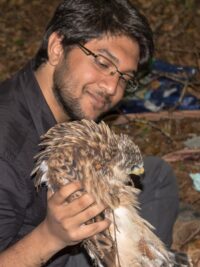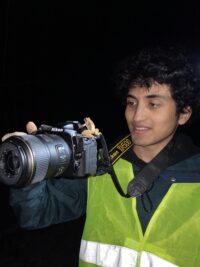GRADUATE STUDENTS
Rupinder Bakhshi

Rupinder is interested in coupled socio-ecological systems inclusive of community-based forest management, human wildlife conflict and coexistence, and landscape ecology. She worked on diverse aspects of community engagement for conservaon at WWF-India for four years, and received a Fulbright fellowship to pursue a master’s degree at Duke University (2018-2020). Her doctoral research will likely explore intersecons between resource tenure, forest management, conflict and conservaon outcomes in central India.
Michael Levin

Michael translates his interest in the regions where humans and wildlife actively share the landscape into research on the movement ecology of meso-carnivores in North America. His PhD research is on renewable energy landscapes, and specifically focuses on how solar energy infrastructure may influence the movement and habitat selection of bobcats through solar-dense regions of North Carolina.
Erich Eberhard

Erich is interested in using emerging technologies to better understand the link between biodiversity and ecosystem services in tropical landscapes, with the goal of informing land-use strategies that advance conservation and human wellbeing. To complement his research, he develops multimedia projects that explore environmental narratives and enable community participation in research and management. He is co-advised by Ruth DeFries and Shahid Naeem.
Anubhav Vanamamalai

Anubhav’s research is geared towards achieving wildlife conservation goals in a human-dominated landscape, with an emphasis on integrating scientific research with on-ground implementation. His previous work with non-profit organizations in India explored the effective use of conservation technologies in addressing human-wildlife conflict. His doctoral research work will focus on human-wildlife interactions, landscape ecology and land-use change, and the intersection of policy, economics, and wildlife conservation.
Soham Mehta

Soham is broadly interested in action-based conservation research in human-modified landscapes, integrating animal ecology, human-wildlife interactions, and political ecology. His previous work as an undergraduate at the University of Vermont focused on the spatial ecology of free-ranging domestic dogs in west-central India. Currently, for his master’s research, he is working on human-wildlife conflict, focusing on modeling the spatial risk of livestock depredation in the Peruvian Amazon in collaboration with WWF Perú.
POST DOCS
Benjamin Clark

Benjamin Clark received his PhD from the Department of Ecology, Evolution and Environmental Biology. He is now working on nature-based solutions for climate mitigation in India.

